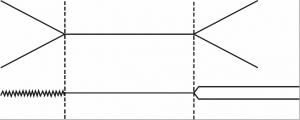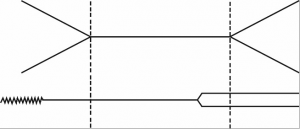American English Phonetics
Another American English Faculty Project
9.3 Glottal reinforcement (glottalization) and glottal stopping (glottaling)
In syllable-final position, GA /p,t,k/ as in sip, sit, sick or sips, sits, six, tend to be glottalized (or glottally reinforced). A glottalized stop is produced when the oral closure for the stop is accompanied by a simultaneous closure of the vocal cords.
The closure of the glottis may also take place just before the oral closure, in which case we speak of a pre-glottalized stop:
In either case, the auditory impression that is created is that of a sudden silence: this is due to the sudden closure of the glottis, which causes the vocal cord vibration for the preceding voiced sound to be cut off abruptly. GA tends to have glottalized as opposed to pre-glottalized /p,t,k/, the latter being common in British English. Glottalization is more common for /t/ than for /p/ and /k/.Before a pause, glottalized /t/ is normally unreleased or, strictly speaking, released inaudibly. Owing to the presence of the glottal closure, the air from the lungs is compressed behind the vocal cords rather than behind the alveolar contact higher up in the speech tract. As a result, there will not be enough air trapped behind the oral closure for an explosion to occur, and the release will be inaudible. Before a pause, /p/ too is usually unreleased: while the lips continue to be closed the soft palate is lowered, allowing the air to escape inaudibly through the nose. Alternatively, /p/ may have a weak but audible oral release. This is in fact the most common realization for final /k/, as in sick.
In coda-final positions, GA /t/ may also be realized as a glottal stop. In this case, we speak of glottaling (or glottal stopping) rather than glottalization. The difference between the two lies in the absence of an alveolar contact for glottaled /t/: the oral closure is replaced with a glottal closure, not accompanied by it:
sit [sɪʔ]
sit – [sɪʔ]
button [ˈbʌʔn]
button – [ˈbʌʔn̩]
atlas [ˈæʔləs]
atlas – [ˈæʔləs]


